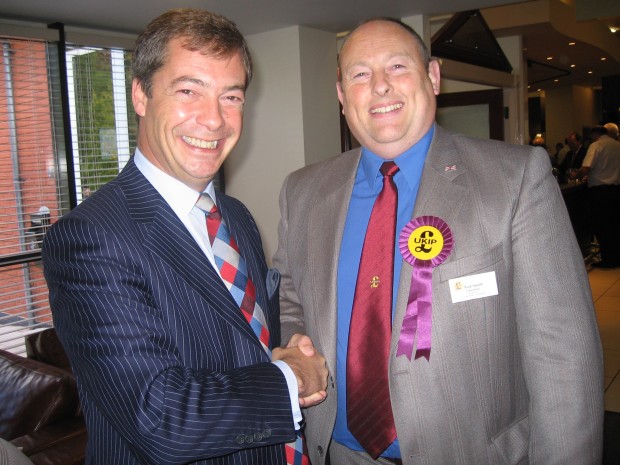
When his wife got fed up with him shouting at the telly, Nick Smith joined UKIP. Now he is campaigning to be elected as the MP for Lincoln.
“In my younger days I joined the army because I believe in my country and wanted to serve it. Later, I joined UKIP, because I believe Britain will do better outside the European Union.” Nick Smith gets easily pumped up when discussing his political views and, unsurprisingly, the conversation quickly turns into a debate about the EU.
“When I became active, UKIP did not have many members. I called our central office and asked if I could stand for the party in Lincoln. They replied that I probably could,” Nick said.
His first go at a General Election was poorly organised and Nick admits they did not have much of a clue. The result was not so bad, securing 3.5% of the vote. In 2010, however, both the British National Party and the English Democrats – two other right-wing parties – also stood in Lincoln. Nick saw his share of the vote slip to 2.2%.
Much has changed since 2010. UKIP have broken into mainstream politics, winning the European elections, making huge gains in local elections across the country and polling up to 20% nationally. What was a little known fringe party five years ago is now recognised by everyone.
“Now, you must be living under a rock to not have heard about UKIP. That recognition is very important and will carry me further in this election,” Nick hopes.
Conservative peer Lord Ashcroft paid for a local poll of the Lincoln constituency in August 2014, showing a surge in UKIP support, from 4% to 18%. However, Nick was still trailing Labour on 37% and the Conservatives on 33%. Does UKIP really have a chance?
He admits that he is not the favourite to win, but that his chances are better than ever: “If you had asked me this two years ago, I would say we could never win. But now the situation is very different.
“We already have two MPs and next week we might win over ten seats. Maybe we will hold the balance of power? Who knows?”
One of Nick’s favourite topics is Britain’s membership of the European Union. He believes directives from the EU blocks Britain from investing vital resources into the country’s industry.
“Just look at the steel industry,” he suggested. “By the early 1980s it employed over 300,000 people. When the price of steel fell for a few years, most of it was sold off to foreign companies. The government should have supported it when it was struggling and get the rewards from the good years that followed. Today, we don’t even have that option because of the EU.
“The EU is not democratic either. Yes, we can vote on who will sit in the European Parliament, but not in the executive and commissions, where the real power is. It’s like the Soviet Union, you can vote for whoever you like, but it will not make a difference.”
In addition to the EU, Nick is pushing for an energy revolution. He believes strongly in the potential of liquid hydrogen to power engines.
“The government should invest in hydrogen technology. It could be used to build specially designed hydrogen-fuelled trucks. British industry hasn’t produced trucks for decades, but all that could change.”
On immigration, Nick criticises the government for not deporting asylum seekers who had their applications rejected.
“Immigration can be a good thing, but it has to be done in a controlled way,” he explains.
“Today, far too many unskilled people come to Britain, where we already have many unskilled workers who are unemployed. It does not make sense.”
One standpoint that might surprise people is Nick’s support for nationalisation of the railways. He argues that British Rail was “decimated” by the Thatcher government, just to fill a few shareholders’ pockets.
“If we had kept British Rail and invested in it, we would have had a great rail service,” he added.

